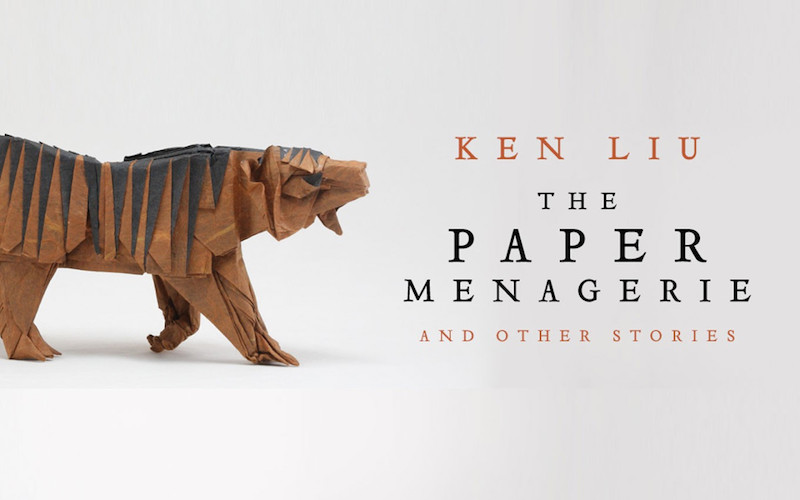The Paper Menagerie

Nine pages rarely have such a deep, strong impact as The Paper Menagerie. This Ken Liu short story centers on the story of Jack, a little boy who was raised by his Chinese mother and American father. We learn that Jack’s mother was picked out of a catalogue and brought to the US, but his dad took good care of his mom; and we don’t learn anything else about his mom until the very end of the story. When he was younger, Mom would always make him origami paper toys; one of the toys she made him was Laohu (老虎), which means tiger in Chinese. When Jack was little, he would play with his paper tiger, pretending that it is real and having it jump and roar and do all the other things that real tigers do.
However, one day, Jack was playing with Mark, the “popular kid” at school, who brought his star-wars action figures. Jack wasn’t impressed and thought that Mark’s toy didn’t look like the real Obi-Wan at all, so Mark asked him to show him his own toys. Jack brought out his paper menagerie, but to Mark, it looked like haphazardly sewn together bits of paper—trash.
After that incident, Jack decided that he wanted to be American: he wanted to stop eating Chinese food, get some “real toys,” and have his mom only speak English, and Jack slowly stops talking to his mom entirely because of this. The rest of the story focuses on Jack learning about his mother’s past.
The story was deeply relatable to me in particular for a couple of reasons, but the main reason, I think, is because of the subject matter. Both of my parents immigrated from China in their 20s, and both of them brought the culture and traditions of their families with them. I eat all of my meals with chopsticks (unless there’s soup, where I grab a spoon as well), and we eat Chinese food pretty much every day. The parallels to the story are self-evident.
I could see myself in Jack’s shoes; in many ways, I felt like I was already becoming Jack. I never learned to speak Chinese well or even read or write it at a competent level. I feel increasingly disconnected from my heritage and my culture—I haven’t been to China since I was 2 years old. The Paper Menagerie made me realize how precious my family was, but more importantly, how precious my culture was. It made me realize how easily I could lose all of it, and that once I lost it, I would want to return—but it would be too late. It felt like it was directly attacking me, and making me feel like I was abandoning a part of my identity, and that is what made it so powerful.
Liu’s stories went deep into my marrow, laying bare painful truths, meticulously slicing through the layers of pearl to find the grain of sand at its heart.
I am not alone in this feeling. Amal El-Mohtar, from NPR, writes, “Ken Liu’s The Paper Menagerie and Other Stories is a book from which I staggered away, dazed, unable to speak.” Although she doesn’t have the same chinese background that both me and the author have, El-Mohtar still recognizes the impact of the story, because it speaks to common themes of immigrants, family, and identity. And El-Mohtar recognizes all of this—she agrees that the Paper Menagerie cuts through barriers and deep into the soul and makes us introspect and think about who we are. “Liu’s stories went deep into my marrow, laying bare painful truths, meticulously slicing through the layers of pearl to find the grain of sand at its heart.”
The Paper Menagerie was the first work of fiction to win the Nebula, the Hugo and the World Fantasy Award, and for good reason. It’s a must-read for anyone because of its brevity and emotional punch. Regardless of who you are or what your background is, I cannot recommend The Paper Menagerie enough.
Amal El-Mohtar’s thoughts on The Paper Menagerie: https://www.npr.org/2016/03/13/468942030/no-paper-tiger-this-menagerie-is-full-of-fierce-feeling